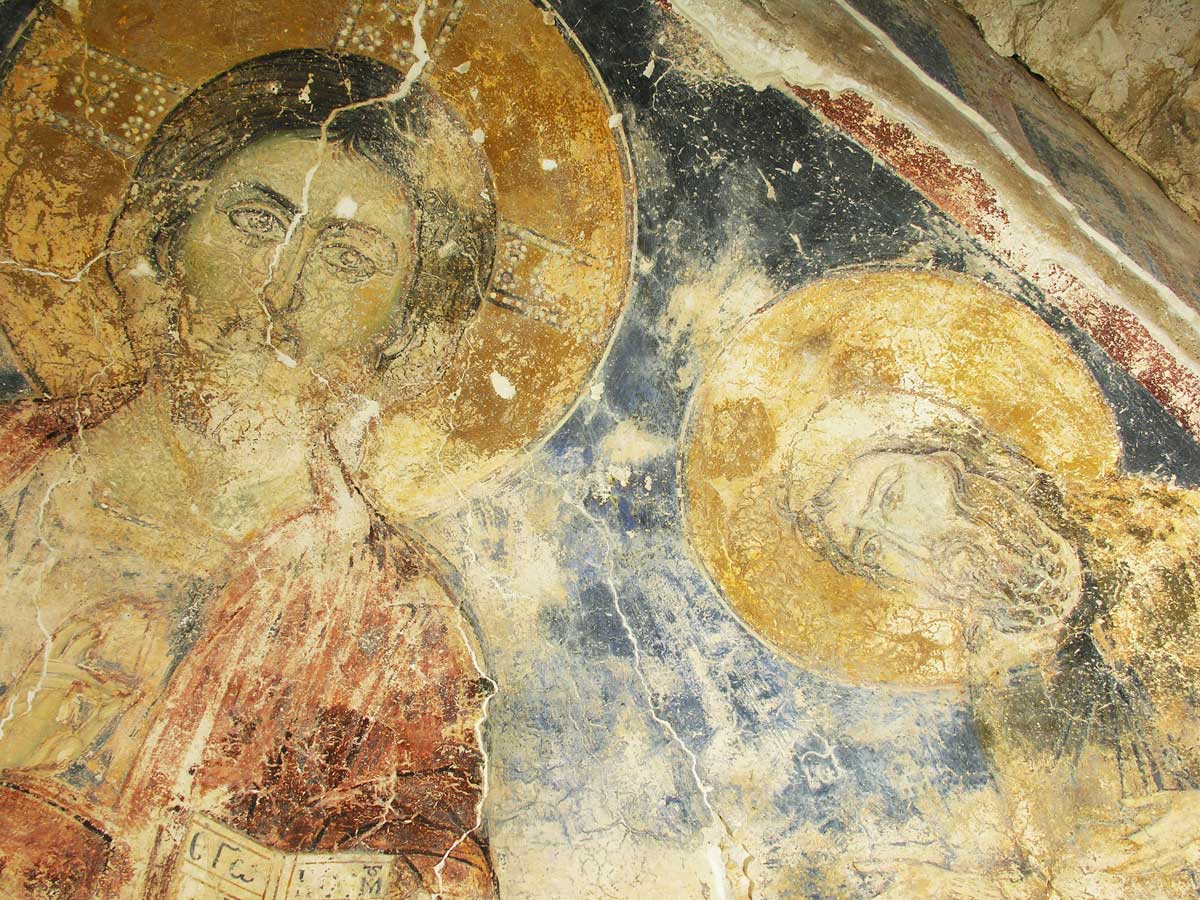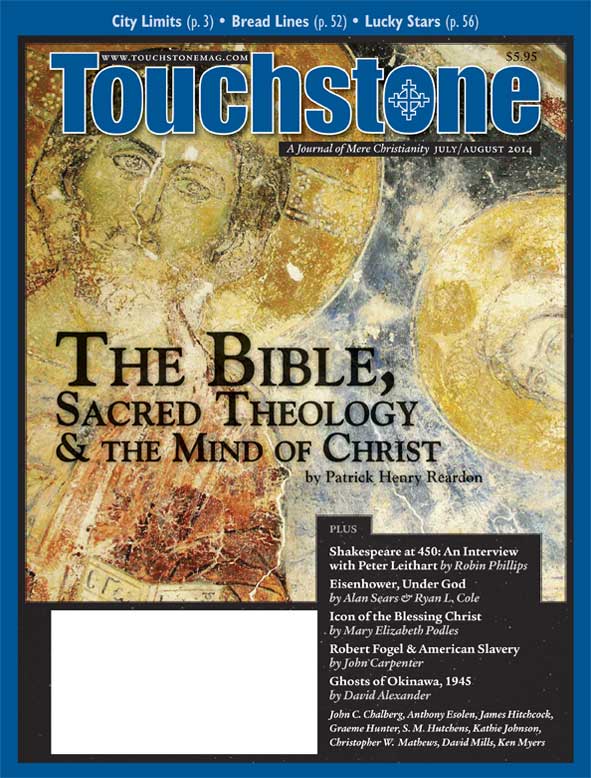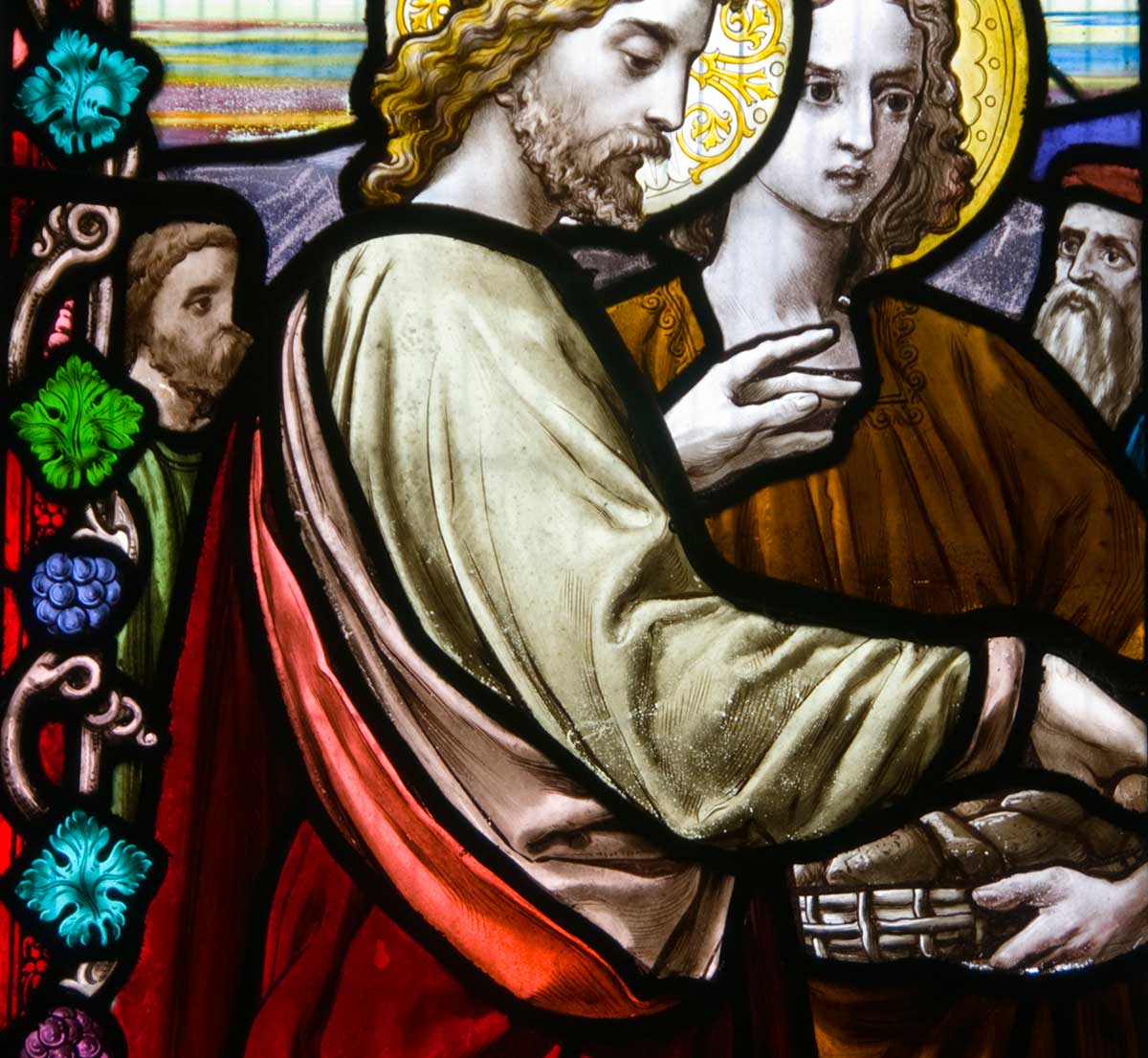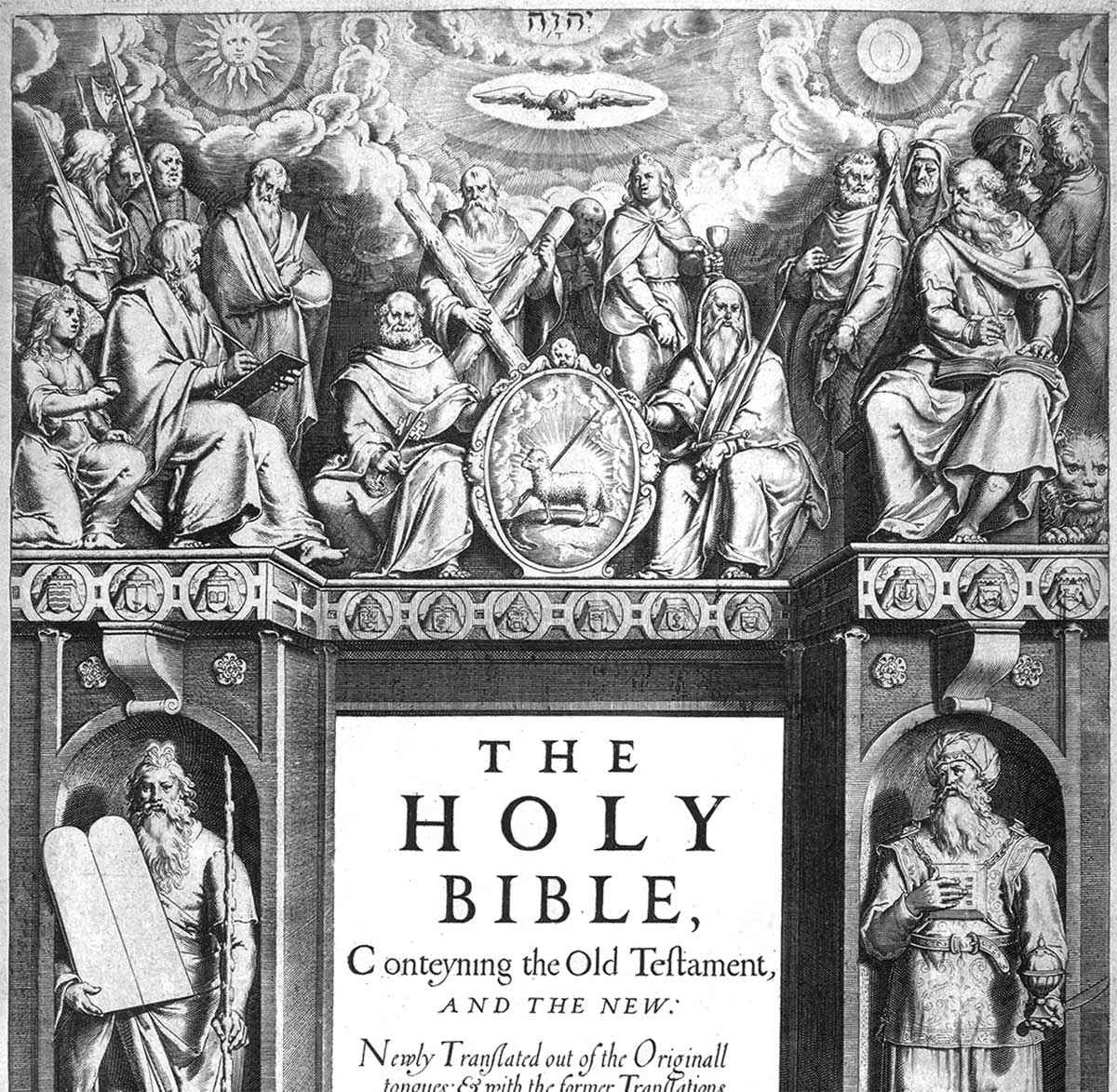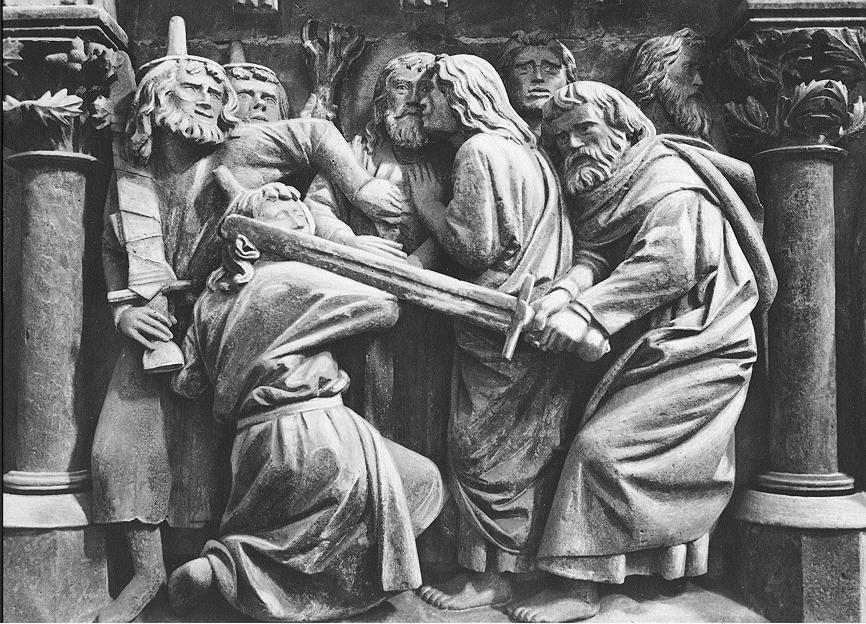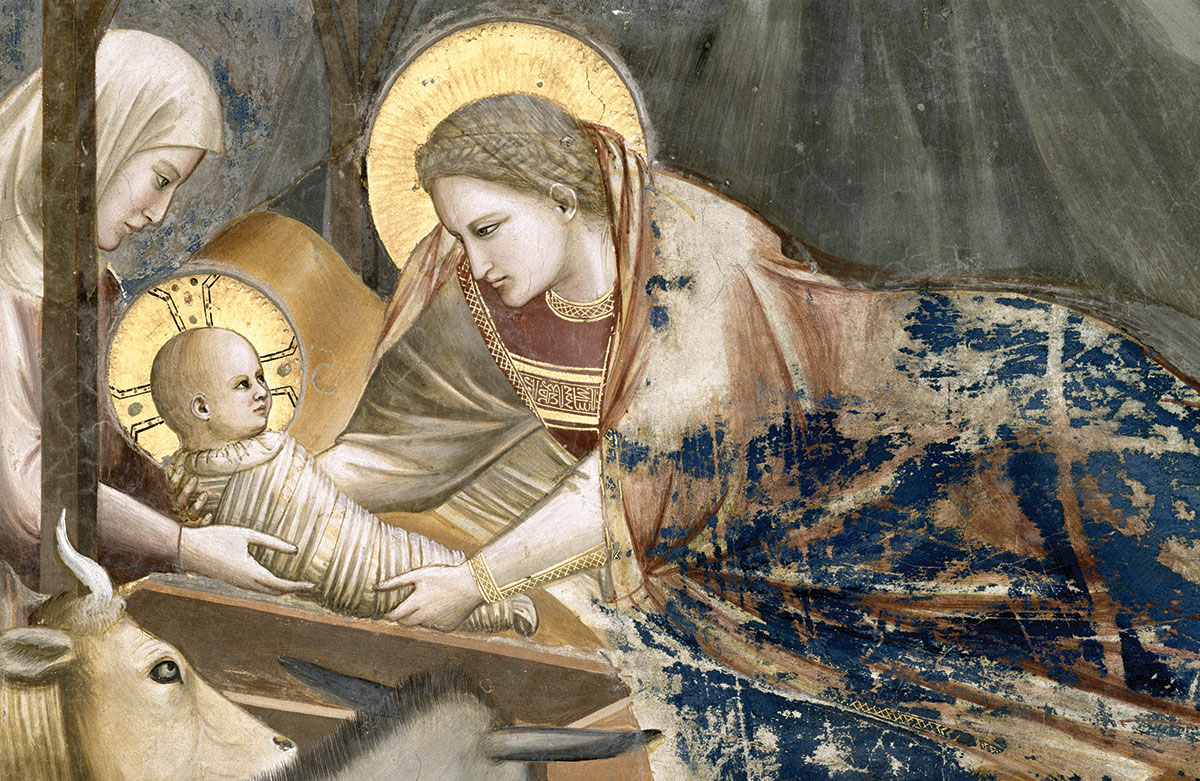Feature
The Things Freely Given
The Bible, Sacred Theology & the Mind of Christ
Having been asked to present some reflections on the theme, "What is the Bible?" it seems appropriate to begin this essay with a passage from Sacred Scripture.
Indeed, I want to begin these reflections by analyzing and comparing two passages from the New Testament, one from the second chapter of 1 Corinthians and another from the eleventh chapter of the Gospel according to Matthew. Each of these chapters contains a contrast between the wisdom of fallen man and the wisdom God gives to those who believe in his Son.
Thus, 1 Corinthians 2 takes issue with those Christians at Corinth who boasted of their superior wisdom, which St. Paul was careful to distinguish from the wisdom of God revealed in the Cross. The apostle writes, "We speak the wisdom of God hidden in a mystery, which God ordained before the ages for our glory, which none of the rulers of this age knew; for had they known, they would not have crucified the Lord of glory."
Paul goes on to comment, "But the carnal man does not receive the things of the Spirit of God, for they are foolishness to him; nor can he know them, because they are spiritually discerned."
When we turn to Matthew 11, these carnal men, those who do "not receive the things of the Spirit of God," are the citizens of Chorazin, Bethsaida, and Capernaum, who refused to believe the gospel. Jesus, immediately after pronouncing his "woes" against them, went on to identify their moral problem. His prayer, Matthew indicates, was an "answer" to the previous curse. Jesus prayed, "I thank you, Father, Lord of heaven and earth, that you have hidden these things from the wise and prudent and have revealed them to babies."

The distinction between ungodly wisdom and the wisdom of the gospel is the setting in which St. Paul declares what I take to be the subject matter of Sacred Theology; that is to say, the knowledge of ta charisthenta—"the things freely given." Paul writes, "Now we have received, not the spirit of the world, but the Spirit who is from God, that we might know the things freely given to us by God."
The expression, "things freely given," is plural, ta charisthenta. In the context of 1 Corinthians 2, these "things freely given" pertain to Paul's reference just a few verses earlier: "we speak the wisdom of God in a mystery." For Paul, "the wisdom of God"—Theou sophia—is God's redemptive design, which is concealed in the logos tou stavrou, the"word of the Cross."
The expression, "things freely given to us by God," indicates a cognitive plurality in the wisdom of God. That is to say, in the proclamation of "the word of the Cross," it is necessary to employ various words and concepts to designate aspects and dimensions of the "wisdom of God." The proclamation is discursive. Paul goes on: "These things we also speak, not in words taught by human wisdom, but taught by the Spirit—en didaktois Pnevmatos—comparing spiritual things with spiritual."
The Theological Enterprise
This exercise of reflection on the "things freely given to us by God," the charisthenta, I take to be the ministry of Sacred Theology.
The words employed in this reflection are given by the Holy Spirit. Paul proceeds to argue the point by citing the prophecy of Isaiah: "For 'who has known the mind of the Lord, that he may instruct him?'"
Paul answers, "But we have the mind of Christ." Paul, who up to this point has been speaking of the Holy Spirit as the source of God's wisdom, now suddenly speaks of Christ. He does this, I presume, under the influence of the Isaian text he has just cited. This text asks, tis egno noun Kyriou—"Who has known the mind of the Lord"?
For Paul, the Lord is Christ. The mind of the Lord is the nous Christou. Paul's shift of emphasis here strikes me as very important. The whole task of reflection on the wisdom of God in a mystery is dependent on the nous Christou. What does Paul mean, nous Christou?
Because this word, nous, has become such a technical term in Orthodox ascetical literature, we may forget that the term could refer to several things in the usage of antiquity. It did not always mean intellectus. In classical usage nous sometimes meant perception or intuitive feeling. Even in early Christian usage, nous was sometimes nearly the equivalent of phronesis.
For this reason it is not surprising that St. Jerome, in his Latin translation of this text in 1 Corinthians, does not render nous in its expected equivalents, mens or intellectus, but with the word sensus. Jerome, whose classical education in Greek rivaled that of the Greek fathers themselves, was sensitive to the nuance of this expression in the Pauline context. His understanding of the verse is very significant. Whereas the terms mens and intellectus—"mind" and "intellect"—denote the faculty of thought, the word sensus indicates rather the experience of the thinker. It means "perception" or even "manner of thinking."
That is to say, Jerome understands the word nous in this verse to refer to Christ's own experience of knowing. This, says Paul, is the gift of the Holy Spirit. Those who have the nous Christou, the sensus Christi, perceive "the things freely given to us by God" in the way Christ perceives them. Believers enter into—and share—Christ's perception of the divine gifts.
What is it, then, that Christ shares with us believers by the gift of the Holy Spirit? To address this question, I propose to go to our other text, Matthew 11. Let us continue with the words of Jesus just after his prayer to the Father: "All things have been delivered to me by my Father, and no one knows the Son except the Father. Nor does anyone know the Father except the Son, and he to whom the Son wills to reveal him."
According to this text, what Jesus shares with us is his personal knowledge of the Father. This, I take it, is the nous Christou, the sensus Christi. This is, I submit, the font of Sacred Theology. It is an introduction, through the grace of the Holy Spirit, into the mind of Christ, a participation in his perception and understanding.
Sacred Theology is traditionally spoken of as reflection on the content of Divine Revelation. This concept is, I suppose, formally correct. It seems to me necessary, however, to say something further; namely, Sacred Theology must include the experience, the sensus, of Revelation. In other words, there is no what of Revelation apart from the living event of Revelation. What is revealed must not be separated from the experience of its revealing. Sacred Theology must embrace—yes, even begin with—the experienced reception of the knowledge of the Father into the human mind of Christ. Christ understood Holy Scripture from within his relationship to the Father.
The Living Word
This means that Holy Scripture, which is the stuff of Revelation, is not simply a record of what was divinely disclosed in the past. It is the energetic Word—the Son's communicated knowledge of the Father—in the here and now. Sacred Theology is communion with God in his present and living Word, as we grasp it in the mind of Christ.
The Christian understanding of Holy Scripture comes from within Christ's understanding of Holy Scripture. There is no other theological entrance into the Bible than the mind of Christ.
In the Gospels, in fact, we find our blessed Lord going to the Sacred Scriptures in order to learn his mission and destiny. In his study of the Law and the Prophets, beginning as a youth in the synagogue at Nazareth, Jesus was not "working out" a religious theory. He was taking possession of his own identity.
This was a process of growth, and Jesus' study of the Hebrew Scriptures was integral to that growth. He did read books, and he learned from them. The works of Moses, David, Jeremiah, and the others truly contoured his mind and conscience. The mental horizon of Jesus, as we discern it in the four Gospels, took shape during those long years at Nazareth, where—Luke tells us—he went to the synagogue "according to his custom."
So when Luke also says, "Jesus increased in wisdom and stature," it is wrong to imagine his growth was unrelated to what he read—any more than his increase in stature was unrelated to what he ate (Luke 2:52).
Luke is our chief source on this matter. In fact, he is the evangelist who describes Jesus reading and interpreting Isaiah near the very beginning of his pubic ministry (Luke 4:16–21).
The Law and the Prophets shaped his self-awareness in an unparalleled way, because the Savior found in those writings his identity, vocation, and mission. His grasp of those texts—an understanding at the root of Christian theology—is the very substance of Jesus' "self-regard." It was in studying the Hebrew Bible that Jesus became convinced, "I must be about the things of my Father" (Luke 2:49).
What David and Isaiah wrote, then, was not something different from who Jesus knew himself to be—and what his Father summoned him to do.
The Gospel of Luke indicates, moreover, that this understanding increased in Jesus. It did not happen all at once, because human understanding always takes time. Jesus took personal possession of the Hebrew Bible as he lived and ministered, as he suffered, died, and rose again. As events unfolded in his life—and particularly when he "endured such contradiction of sinners against himself" (Heb. 12:3)—Jesus grasped ever more explicitly the meaning of God's Word. These books governed his life and destiny.
Later on, in the very act of sending the apostles out to evangelize the world, Jesus "opened their understanding, that they might comprehend the Scriptures" (Luke 24:45). The proclamation of the gospel was to include the incorporation of the Hebrew Scriptures. Christian theology begins with—and is inseparable from— understanding the Old Testament as Jesus understood it.
The meaning of the Sacred Scriptures is a preoccupation of Luke's Gospel from the start. It was the burden of Jesus' first sermon at the synagogue in Nazareth. It was the subject of his conversation with Moses and Elijah on the mount of the Transfiguration. In the Emmaus story in chapter 24, Jesus feigns ignorance precisely with a view to teaching the two disciples—and through them, all Christians to the end of time—his own understanding of the biblical text.
All of Christian doctrine is rooted, I believe, in Jesus' paschal discourse to the two disciples on the way to Emmaus. The timing of that discourse is likewise significant, for it took place on the very day of his rising from the dead; on that day, "the Lion of the tribe of Judah, the root of David," demonstrated that he "was worthy to take the scroll and to open its seals." He was worthy to do this because he was slain and had redeemed us to God by his blood (Rev. 5:5,9). Jesus interprets Holy Scripture—indeed, he is the interpretation of Holy Scripture—because he "fulfills" Holy Scripture through the historical and theological events of his death and Resurrection. His blood-redemption of the world is the formal principle of Christian biblical interpretation.
As for the two disciples on the way to Emmaus, Jesus continues to act his play to the end: "Then they drew near to the village where they were going, and he indicated that he would have gone farther." This is at least the third time, since the trip started, that Jesus teases these men in order to take the conversation in the direction he wants it to go. As though reluctantly—and only at their explicit invitation—"he went in to remain with them."
At last, Jesus' points of instruction having been made, "he took bread, said the blessing, and broke it, and gave it to them. Then their eyes were opened and they knew him; and he vanished from their sight."
The two disciples promptly turn around and head back to Jerusalem. As they return, they reflect that their hearts burned within them as the Stranger spoke to them on the way and interpreted the Scriptures.
Multiple Senses
I want to extend the present considerations by observing that there is more than one legitimate approach to the Sacred Text. Christian history itself—starting with the corpus of the New Testament—testifies to a legitimate exegetical variety, in which the rich meaning of Holy Scripture is never reducible to just one framework, nor to a single formula. The Church has always insisted that the Bible is open to more than one approach, as long as each interpreter stays within, and takes his guidance from, the Rule of Faith (as explained, for example, by St. Augustine of Hippo, in The City of God 15.26).
Let me start, for example, by mentioning the standard fourfold outline formulated by St. John Cassian in the early fifth century (Conferences 14.8).
This traditional outline speaks first of the literal or historical sense of the text, the meaning originally intended by the biblical writer himself.
Second, this literal sense of the Bible is transformed by its doctrinal significance discerned in the light of Christ. This is the deeper meaning of Holy Scripture indicated by the risen Lord, who "beginning at Moses and all the Prophets, expounded to them in all the Scriptures the things concerning himself" (Luke 24:27).
Following the lead of St. Paul, sacred tradition calls this meaning the Bible's allegorical sense (allegoroumena—Gal. 4:24), the newer, more complete significance, the sensus plenior evoked from the sacred page through its fulfillment in the Mystery of Christ.
The third sense in Cassian's traditional outline is the Bible's tropological or moral sense, its existential, practical, and concrete application to the life of the believing reader. We perceive this sense of the Old Testament in St. Paul's applications of the sacred text to the Christian's moral life, as when he wrote of the ancient Israelites in the desert, "all these things happened to them as examples, and they were written for our admonition, upon whom the ends of the ages have come" (1 Cor. 10:11). In addition to such negative examples, the New Testament offers many positive Old Testament models, such as Elijah (James 5:17) and Rahab (Heb. 11:31).
The Christian reader, in his assessment of these moral examples, will be careful to interpret the text not only according to the ethical standards of the Old Testament but also in the full light of the gospel. That is to say, the Christian moral life is always life under the guidance of the Holy Spirit, not according to the bondage of the Law.
Still following Cassian's interpretive outline, we come to the fourth level of significance in Holy Scripture—its anagogical or eschatological sense—which is the meaning that it has with respect to the last things, the definitive fulfillment of all history.
In addition to the fourfold exegetical pattern outlined by St. John Cassian, let me suggest another Christian avenue to the Old Testament.
The approach I have in mind differs from Cassian's in the following way:
Cassian's doctrinal outline is constructed on the actual process of the history of salvation. It begins with the history of the Old Testament in proper sequence, an understanding of the Hebrew Scriptures on their own terms, so to speak, their own meaning in their own settings, and then goes on to examine the Old Testament through the perspective of the New, the lens of Christ.
This exegetical process is the movement from letter to spirit, in which the meaning of the New enhances the meaning of the Old Testament.
Next, there is the understanding of the sacred Scriptures as they are read and applied in the concrete lives of Christians. Finally, there is the ultimate fulfillment of God's Word, when all signs and images have been absorbed into the light of eternal beatitude.
The value of the traditional "four senses" of Scripture is practical; it is a useful aid to the organization of theological analysis. It clarifies by distinguishing, and the proper formulation of distinctions is one of the tasks of the theologian.
The other approach, the one I am suggesting now, is less concerned with distinctions. Nor does it begin with the historical, literary study of the Hebrew Scriptures. It begins, rather, with the personal history of the Gentile (like myself) who comes to Christ, not through the inherited history of the Old Testament, but through the original, straightforward proclamation of the gospel.
I ask myself, why should I be interested in those ancient Hebrew writings in the first place? What connection do they have with me? And I answer, those ancient books have no theological connection with me except on account of Christ. Christ alone is my link to those writings.
That is to say, I do not begin with the Old Testament. I begin with Christ. I commence with the Center. Christ is not only the Mediator between God and man; he is also the Mediator—the distributed middle—between the Old Testament and the Church.
In this way, we Christians actually begin to grasp the Old Testament according to its spiritual meaning, its allegorical sense, its Christological significance. As Christians, we only go to the Old Testament because it pertains to Jesus. Otherwise, the Old Testament is, for us non-Jews, just another ancient book. We accept it as our Bible only because it is Jesus' Bible. In truth and strictly speaking, after all, it is only Christ that makes the Old Testament theologically pertinent to us. Without Christ, the Old Testament is not really our history. We have no continuity with it—it is not part of our memory—except through Christ.
The Christ proclaimed in the gospel brings the Old Testament with him in the proclamation. Indeed, the barest preaching of the gospel includes the Old Testament, in the sense that what Jesus accomplished for our redemption was "according to the Scriptures" (1 Cor. 15:1–4). The Christ we proclaim is proclaimed as the fulfillment of the Scriptures. It is in these swaddling clothes that the Messiah is adorned.
Our Spirit-prompted acceptance of the gospel, then, the saving gift of our faith by which we are joined to Christ, also joins us, through Christ, to the ancient faith of the Hebrews who awaited his coming. Through Christ, their history becomes our history; we are engrafted into the Bible's ongoing chronology. The Hebrew Scriptures become our own family album. The history of the Bible and the history of the Church form a single narrative, of which our lives are an integral part.
History & Sacred Scripture
Something further must be said about the relationship between history and Holy Scripture:
First, the Bible not only records history; it also creates history. By this I mean that the Bible, as written down, read, and proclaimed in the ongoing community of faith (the Church of both Testaments), influences and directs the course of history. We ourselves are part of the history created by Holy Scripture. We are the qahal, the ekklesia, the gathering of those who in the Holy Spirit are assembled to attend to God's Word. In the history it records, the Bible itself prolongs that history in those who receive it in faith.
Second, this unified history, comprised of what the Bible records and what the Bible creates, is a single, living, ongoing reality, in which there is a continuity between the words of Holy Scripture and the Church's understanding of those words. If there were to be a break between the Bible and its interpretation, that continuity would be lost. There would be a disruption in salvation history. This is the tragedy known as "heresy."
Third, this continuity is called Holy Tradition, which embraces, as a single reality, the history narrated in the Holy Scriptures, the Holy Scriptures themselves, and the one, holy, catholic, and apostolic Church that reads these Scriptures in her worship, understands them in her teaching, and proclaims them in her ministry to
the world.
The biblical history narrated in the Church by the reading and proclamation of the Scriptures is the early part of the Church's own history. It is our history, and we in the Church understand it as our history.
Fourth, essential to a Christian understanding of Sacred Scripture is the principle of analogia. That is to say, a perception of proportion and measurement is at the heart of the exegetical and theological enterprise because of the unity, coherence, and integrity of God's Word during the long course of history.
In Jesus' declaration, "All things have been delivered to me by my Father," it is important to observe the plural sense of the subject: "all things," panta. This usage corresponds to the plurality indicated by the Apostle Paul in 1 Corinthians 2; these panta are identical to "the things of God" (ta tou Theou), "the things freely given to us by God" (ta hypo tou Theou charisthenta hemin). These "things" are real; God shares with us the realities of salvation.
Since the task of Sacred Theology is to reflect on those realities in an intelligible way—to feed the souls of God's people—it is imperative that the Holy Spirit endows the Christian thinker with the capacity to discern the analogia that unites the components of Divine Revelation to each other in the single message called the "Gospel." The "things of God" are revealed—are given—in a proportioned fashion; they are measured by a coherence the grace-filled mind
can discern.
St. Paul introduced the word analogia into Christian theological terminology when he wrote of the gift of prophecy:
For I say, through the grace given unto me, to every one of you, not to think of himself more highly than he ought to think; but to think wisely, according as God has measured (emerisen) to everyone the measure of faith (metron pisteos). Thus we, being many, are one body in Christ, and each of us members one of another. Having then gifts (charisthenta) differing according to the grace that is given to us, whether prophecy, according to the proportion of the faith (kata ten analogian tes pisteos); or ministering, in the ministry; or the teacher, in instruction. . . . (Rom. 12:3–7)
The sense of analogia here is determined by the context: Paul is speaking of various ministerial gifts conferred on certain members (mele) of the Church. This context rules out the interpretation that "the measure of the faith" is a creedal norm, something identical to what second-century Christians called "the rule of faith" (kanon tes pisteos, regula fidei).
On the contrary, Paul's analogia here refers to a particular ministerial gift. It is a special kind of interpretive discernment the Holy Spirit confers on particular believers. It pertains to the gift of prophecy as a quality; it is the way in which faith is measured—proportioned—in the discernment given to certain members of the Church. This analogia is not the "measure of the faith" itself; it is the perception of measure in the things pertaining to the faith.
This sense of the word is clear from the context in Romans 12, including the parallelism between "God has measured to everyone the measure of faith" (hekasto ho Theos emerisen metron pisteos) and "according to the grace that is given to us" (kata ten charin ten dotheisan hemin) (Rom. 12:3,6). In short, Paul's concern in this context is not the objective content of the Christian faith (fides quae creditur) but faith-filled discernment in the gift of prophecy.
My own use of the term, analogia, is an extension of this sense. As an exegetical and theological term, it can have several meanings. For example, analogia can refer to the many correspondences the New Testament mentions between the events in Old Testament history and the experiences of living Christians. When Paul wrote of the Israelites in the desert, "these things were our examples" (1 Cor. 10:6), he discerned an analogia uniting different stages in the history of salvation.
Again, as we have seen, analogia pertains to the proportions discerned in the material components of Revelation. Notwithstanding the paradoxes inherent in the Christian faith, sound theology eschews any notion of contradiction in what has been revealed. Analogia refers to that consistency, unity, and integrity.
Theology also recognizes an analogia between the revelation given in the structure of Creation and the mysteries of the Kingdom. Indeed, this "measurement" is the necessary presupposition of many of Jesus' parables. Analogia is operative in that literary form known in Hebrew as the mashal, the symbolic word.
Indeed, to the extent that Sacred Theology uses human language at all—as required by Sacred Scripture!—it implies an analogical potential already at work in human consciousness and the history of philosophy. If this were not the case, it is unclear how God's Word could—as we know it did—find expression in human thought. God works with what, by his creation, we have.
Theoria
Fifth, the correct understanding of Holy Scripture includes what some of the church fathers called theoria, meaning the spiritual discernment of the inner sensus of the Bible through the lens of Christ.
This inner sensus of Scripture is not abstract; it pertains to one's personal life in Christ as a living member of the Church. That is to say, true theoria involves understanding the Bible in such a way as to illumine the actual living of the Christian life in the Church. The Bible becomes the mirror in which we see our true faces (James 1:23). Theoria is not only an understanding of the Bible, but also an understanding of ourselves in relation to God. It entails the reading of the Bible as a path of self-knowledge and growth in the Holy Spirit.
Theoria includes the perception of historical analogies between our own lives and the history recorded in God's Word. Through the perception of these analogies, we understand our place in history and grasp both what God is doing in our lives and also what we ourselves are supposed to do. This is a Spirit-given insight into the Word of God, permitting that Word to take the measure of our own existence.
Within the Rule of Faith handed down in the Holy Tradition of the Church, these spiritual insights into Holy Scripture are inexhaustible—theoriae quasi infinitae in the words of St. Bonaventure (In Hexaemeron 15.10). In these perceptions the past of the Bible is rendered effective in the life of the Christian, because both are integral to a single history. Through these theoriai the Holy Scriptures provide the pattern for understanding all of history. There can be no "theology of history" except through the full, experienced understanding of the Bible.
This spiritual exegesis of the sacred Scriptures, however, always takes place in history and pertains to the movement of history. The Bible is not a reservoir of truths that can be removed from a historical shape.
Understanding of the Bible must not become something abstracted from the historical movement of the Bible itself. Its continuous line, which records history, is recorded within history and gives form and shape to future history.
Dogmatic Definitions
What, then, should be said about dogmatic pronouncements by which the Church seems to "fix" doctrine, to remove biblical teaching from its historical context? The correct answer to this question, I believe, must involve two considerations:
First, such dogmatic pronouncements, far from being an abstraction from history, also take place within history. To solidify a doctrine into a dogma does not sunder the doctrine from history. History is not to be described solely as fluid. It is obvious that a great deal of history—the past!—is absolutely settled and fixed.
There is no history without continuity, and dogma is the guarantor of continuity. In this sense, dogma is essential to history.
Dogmas are not timeless, but they are fixed and unchanging. Theology grows, but dogma does not develop. It is fixed, absolute, and dependable, giving guidance to subsequent history. I presume to cite, on this point, one of the most learned theologians of recent times, Father Georges Florovsky: "Dogma is by no means a new Revelation. Dogma is only a witness. The whole meaning of dogmatic definition consists of testifying to unchanging truth, truth which was revealed and has been preserved from the beginning" (Collected Works, vol.
3, p. 30).
Second, dogmatic pronouncements, even when they are formulated in a positive way (such as the homoousios of Nicaea), tend essentially to serve a negative purpose. Dogmatic formulations form the hedge around the garden. They are not the garden itself. Consequently, the dogmatic formulations of the Church are essentially apophatic; they instruct the gardener where not to go. They are "definitions" in the sense of setting limits (fines), lines to exclude heresy. They do not "clarify" divine revelation by adding light, as it were, to what is already the fullness of light.
Finally, there can be no real understanding of the Bible in the present without an understanding of the Bible in the past, both the past as recorded in the Bible itself and the past in the sense of the Church's historical understanding of the Sacred Text. The attempt to come to Holy Scripture outside of that long historical context is not only presumptuous; it also separates the reader from the Bible's own history.
Sacred Theology is inseparable from history. Those who would participate in its elaboration must be daunted by the challenge published by Father Chenu some six decades ago: "In a way, the history of theology falls within theology itself. A perfect history of theology, if one existed, would yield a theology of history" (from the Introduction to his La théologie au douzième siècle). •
Patrick Henry Reardon is pastor emeritus of All Saints Antiochian Orthodox Church in Chicago, Illinois, and the author of numerous books, including, most recently, Out of Step with God: Orthodox Christian Reflections on the Book of Numbers (Ancient Faith Publishing, 2019).
subscription options
Order
Print/Online Subscription

Get six issues (one year) of Touchstone PLUS full online access including pdf downloads for only $39.95. That's only $3.34 per month!
Order
Online Only
Subscription

Get a one-year full-access subscription to the Touchstone online archives for only $19.95. That's only $1.66 per month!
bulk subscriptions
Order Touchstone subscriptions in bulk and save $10 per sub! Each subscription includes 6 issues of Touchstone plus full online access to touchstonemag.com—including archives, videos, and pdf downloads of recent issues for only $29.95 each! Great for churches or study groups.
Transactions will be processed on a secure server.
more on bible from the online archives
more from the online archives
calling all readers
Please Donate
"There are magazines worth reading but few worth saving . . . Touchstone is just such a magazine."
—Alice von Hildebrand
"Here we do not concede one square millimeter of territory to falsehood, folly, contemporary sentimentality, or fashion. We speak the truth, and let God be our judge. . . . Touchstone is the one committedly Christian conservative journal."
—Anthony Esolen, Touchstone senior editor






